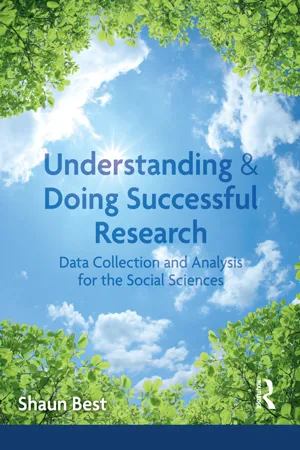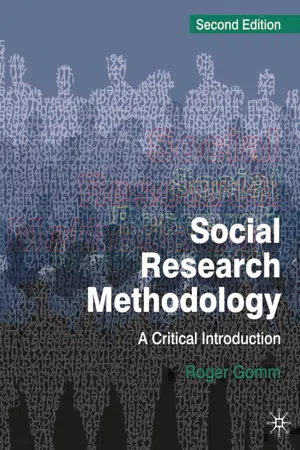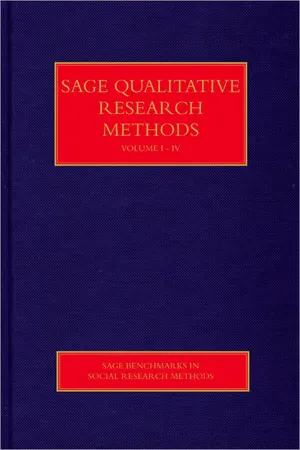Social Sciences
Ethics in Sociological Research
Ethics in sociological research refers to the moral principles and guidelines that researchers must adhere to when conducting studies involving human subjects. This includes obtaining informed consent, ensuring confidentiality and privacy, and minimizing potential harm to participants. Adhering to ethical standards is essential for maintaining the integrity and credibility of sociological research.
Written by Perlego with AI-assistance
Related key terms
1 of 5
12 Key excerpts on "Ethics in Sociological Research"
- Anne Wade(Author)
- 2020(Publication Date)
- Society Publishing(Publisher)
Ethics in Research 2 CONTENTS 2.1. Introduction ...................................................................................... 32 2.2. Basic Concept of Ethics ..................................................................... 32 2.3. Ethics In Research ............................................................................. 36 2.4. History of Ethics In Research ............................................................. 38 2.5. Principles For Ethical Research ......................................................... 43 2.6. Major Considerations In Conducting Research .................................. 46 2.7. Ethical Issues In Research ................................................................. 52 2.8. Conclusion ....................................................................................... 57 References ............................................................................................... 58 Chapter Research Methods in Crime, Justice, and Social Problems 32 Ethics is concerned with the moral behavior of humans. It emphasizes that people should be guided by moral principles when they strive to achieve their goals. This chapter explains the basic concept of ethics. It explains how ethics applies to the field of research. The chapter also presents an elaborate history of how ethics evolved in research. The researchers are guided by some principles so that the study is conducted in an ethical manner. The chapter explains these principles. There are some important considerations to be followed in research which the chapter explains in detail. Finally, the chapter highlights the ethical is-sues which can arise in research. 2.1. INTRODUCTION Ethics is a branch of philosophy which addresses morality of human action. It stresses the concept that people should behave morally while striving to attain their goals. It also refers to a set of practices and guidelines that offers a basis of moral guidance in a particular field.- Marko Nikolic(Author)
- 2019(Publication Date)
- Society Publishing(Publisher)
There are many government policies that require the researcher to follow research ethics that utilizes the human subjects and follow the moral rules in Human Research. All researchers are expected to follow the rules. The communities are generally pluralistic, cultural background and security are very important issues for social researchers while doing fieldwork in developing countries. This type of situation prevailing in developing countries can lead to denial of permission by officials to researchers for doing fieldwork citing the conditions. The mission for the new findings and gaining deeper knowledge in a planned manner is called research. Scientific knowledge is worth the cost and is of great value. The social conditions can be changed for better by implementing the recommendations of research studies. The final target of doing research is to find the truth. The essential part of research ethics is scientific integrity the selections by humans being, actions, and relations, standards, and institutions, beliefs, and historical developments, works, and traditions, language, thought, and communication are all comes under the subject of cultural and social studies. In the process of conducting research there is pre-condition that is empathy and understanding. It has opened the opportunity for researchers and there are multiple explanations of the same factors. Though, the weakness and indecisiveness with the research cannot free researchers from the duty to avoid random opinions and to push for constancy and clarity in their perception. The basic queries of scientific theory are generally in dispute in all the subjects. The recording of data with full honesty and knowledge are the absolute requirements, whatever the position of scholars with respect to theory. Researchers know the research views on society and humanity and this reason usually supports the research in humanities and social sciences factor that is quite enriching.- eBook - PDF
- Mike McConville, Wing Hong (Eric) Chui(Authors)
- 2017(Publication Date)
- EUP(Publisher)
chapter 7 Research Ethics and Integrity in Socio-legal Studies and Legal Research Mark Israel IntrodUctIon M ost academic researchers are concerned about ethics. We like to believe we behave in ways that are right and virtuous for the sake of those who put trust in us and our work; for those who employ us, fund our research and otherwise support our professional activities; and as a result of our own desires to do good. Less charitably, we may also be motivated to behave ethically by desires to avoid public censure. Unfortunately, many find that it is more difficult to act ethically than we would hope. Often, researchers in law and socio-legal studies do not have the philosophical training to negotiate sometimes difficult ethical terrain. As we know from our backgrounds in legal ethics, we do not always recognise ethical challenges, nor do we necessarily have the time to make the best decisions. In other work, I have argued that researchers need to extend their capacity to think seriously and systematically about what constitutes ethical conduct. Researchers also need to develop a better understanding of the politics and contexts within which ethics are regulated, wherever they find themselves working. 1 Sadly, these questions are underexplored in legal scholarship – the 1,000-page Oxford Handbook of Empirical Legal Research 2 devotes just one sentence to research ethics, in which one contributor 3 exhorts qualitative researchers to place ethical considerations at the forefront of their mind. Research ethics are important for various fundamental reasons. Ethical behaviour helps protect individuals, communities and environments, and offers the potential to increase the sum of good in the world. Ethical research conduct assures trust and helps protect the rights of individuals and commu- research ethIcs and InteGrItY 181 nities involved in our investigations. - eBook - ePub
Understanding and Doing Successful Research
Data Collection and Analysis for the Social Sciences
- Shaun Best(Author)
- 2014(Publication Date)
- Routledge(Publisher)
2 The ethics of social research By the end of this chapter you should have an understanding of:• the concept of ethics• the need for ethical approval of your research project• the meaning of informed consent and the difficulties of getting this from respondents• what is understood by research misconduct• codes of ethics for researchers• the justifications for confidentiality and right to privacy• how teleological theories of ethics contrast with deontological theories of ethics.IntroductionGood research is valid, reliable and gives the reader an honest account of events or issues under investigation. A code of ‘ethics’ is a set of moral principles about how people should conduct themselves and gives clear guidance on the appropriate way that people should act or behave. All research practice requires an awareness of ethical issues. One could argue that if our research is valid and reliable then it is ethical irrespective of the consequences for the respondents. Some researchers such as Lynoe et al. (1999) take the view that a badly designed research project is by definition unethical. You might want to reflect on this comment after reading the chapter. In ethnographic and other forms of qualitative research ethical issues often emerge during the data collection phase and ethnographers regularly struggle to meet the ethical requirements that professional bodies – such as the British Educational Research Association (BERA), the British Sociological Association (BSA), the Social Research Association (SRA), the Department of Health and in the USA the Code of Federal Regulations – have developed for good research practice. As Wiles et al - eBook - PDF
Social Research Methodology
A Critical Introduction
- Roger Gomm(Author)
- 2008(Publication Date)
- Bloomsbury Academic(Publisher)
Research Ethics 16.1 Introduction ‘Research ethics’ refer to rules of morally good conduct for researchers. Just as research cannot tell us what is the good life, research itself cannot tell us what is morally good research. Research ethics are grounded in moral and political beliefs which are external to the research itself. Research ethics are not first and foremost a matter of individual morality. Rather, they are a communal discipline upheld by communities of researchers and others, who police research conduct. Individual researchers thus have to commit themselves to communal ethics, or suffer censure from their colleagues and sanctions from other agencies. There are communities within the community (Chapter 14); different groups of researchers subscribe to different values. Nonetheless, there is enough common agreement, or enough social pressure, for most to sign up to professional codes of conduct such as those issued by the British Sociological Association (BSA) and other organi-zations listed in the Activity at the end of this chapter. To practise as a doctor, nurse or lawyer, clinical or educational psychologist requires registration with a professional body and breaches of professional 365 16 By the end of this chapter, you will: • Understand the way different ethical prescriptions for research follow from adopting value-neutral or value-led approaches to research (see Chapter 14) • Have considered some of the ways in which harm might come to the subjects of social research, and ways of avoiding this • Have considered some of the ethical dilemmas faced by researchers • Have acquired one of the codes of research ethics in use in social research and used it to appraise the ethicality of a piece of research. And you will know the meaning of the following terms: Accountability • anonymization • confidentiality • informed consent • privacy • randomized controlled experiments • research ethics • sympathetic bias. - eBook - PDF
A Handbook for Social Science Field Research
Essays & Bibliographic Sources on Research Design and Methods
- Ellen Perecman, Sara R. Curran(Authors)
- 2006(Publication Date)
- SAGE Publications, Inc(Publisher)
First, follow-up is rare, and subsequent required reporting to the IRB panel is limited. Second, the scope of ethical considerations does not completely address the nature of social science research, especially if the pro-ject is of some duration, the initial approach is exploratory and open-ended, and the social dimensions of the project are complicated. As research pro-jects lengthen and relationships with those in the locale deepen, the research Chapter 11 ♦ Research Ethics are Essential —— 205 may become richer, but the burdens on the individual respondents and the community may be taken for granted. Or if the research is exploratory, there may be heightened concerns about whether the research procedures will really reveal anything new or open up possibilities for taking research in unanticipated directions that may have subsequent ethical considerations warranting some ethical review. But even more important, social science research is necessarily socially interactive, and by definition, ethical stances and expectations will be invoked in the development of trustworthy rela-tionships between researchers and those in the research site. Thus the weight of ethical responsibilities lies with the researcher and the coping skills gained through disciplinary training (Lederman 2004). For other formal guidance on ethical concerns that exist within the regula-tory domain and beyond it, researchers can sometimes turn to their discipli-nary codes of ethics. These, however, vary dramatically across disciplines, and for some disciplines they are nonexistent. Anthropology, sociology, history, political science, and psychology have well-publicized codes. 17 Each of these disciplines offers guidelines about the ethical issues pertaining to its method-ological approaches as well other dimensions of the profession and discipline. - No longer available |Learn more
An Invitation to Social Research
How It's Done
- Emily Adler, Roger Clark(Authors)
- 2014(Publication Date)
- Cengage Learning EMEA(Publisher)
Although we can scientifically study people ’ s values and their ethical standards, we cannot use scientific methods to determine how to behave ethi-cally in our own work. Instead, social scientists must examine research behav-ior using other frames of reference. To act ethically, each researcher must consider many factors, including safeguarding the welfare of those who partici-pate in their studies, protecting the rights of colleagues, and serving the larger society. As we consider specific ethical principles, we ’ ll examine these issues. RESEARCH IN THE NEWS In 2012, the New York Times published a story about Sudhir Venkatesh, a well-known sociologist and sought-after speaker who through his research on gangs and prostitutes has made sociology seem hip (Kaminer, 2012). However, the Times notes that “ [s]ome of his peers say that in search of a broader readership he takes liberties not appropriate for a scholar: sensa-tionalizing his experiences, exaggerating the reliability of his memory and, in one case, physically assaulting someone … And at Columbia, where he briefly led the university ’ s largest social science research center, he was the subject last year of a grueling investigation into a quarter-million dollars of spending that Columbia auditors said was insufficiently documented, mis-appropriated or outright fabricated ” (Kaminer, 2012). Venkatesh (2012) responded that “ The audit document discussed in the Times article was the beginning of an inquiry, not the end … The article also suggests that I work outside the boundaries of mainstream sociology. I plead guilty. My disci-pline is stuffy and losing relevance daily in the academic and public eye. But, I have never been anything other than scrupulous, honest and ethical in my research, and I have always safeguarded the risk of my research subjects at every moment. - eBook - PDF
- Ian Shaw, Katharine Briar-Lawson, Joan Orme, Roy Ruckdeschel, Ian Shaw, Katharine Briar-Lawson, Joan Orme, Roy Ruckdeschel(Authors)
- 2009(Publication Date)
- SAGE Publications Ltd(Publisher)
9 Social Work Research and Ethics Richard Hugman INTRODUCTION Issues of ethics have become a major concern in social research in recent years. Questions about the ethical dimension of research proj-ects now often assume a significance as great as that of defining research aims or methodol-ogy. This chapter examines the way in which ethics has grown in importance as a dimen-sion of research, specifically focusing on social work research. The chapter considers ethics as an aspect of research practice, locat-ing it within social relationships, especially as these can be understood as constitutive of power dynamics such as the capacity of some people to affect the lives of many others for better or for worse. So the chapter first exam-ines reasons why we ought to be concerned about ethics in social (work) research. Second, it considers ways in which institutional pro-cesses have come to dominate thinking about research ethics and briefly explores the posi-tive as well as the negative implications of this phenomenon. Then the complexities of seeking ‘informed consent’ are examined as a core issue in research ethics, using an exam-ple from practice to illustrate some of the current debates. In the next part of the chapter consideration is given to the challenges pre-sented by recent developments in applied ethics and this is illustrated by a further detailed example. The chapter concludes by re-emphasizing the way in which the ethics of social work research connects research to the wider professional field of social work. WHY SO MUCH CONCERN ABOUT ETHICS? All research is about the creation of knowl-edge, no matter which paradigm informs the aims and methodology. Whether research is qualitative or quantitative, whether it seeks to answer research questions or to test hypoth-eses, however it builds theory, research is undertaken in order to find new ways to understand the world. - No longer available |Learn more
- Frederick J Gravetter; Lori-Ann B. Forzano; Tim Rakow, Frederick Gravetter, Frederick Gravetter, Lori-Ann Forzano, Tim Rakow(Authors)
- 2021(Publication Date)
- Cengage Learning EMEA(Publisher)
Cengage Learning reserves the right to remove additional content at any time if subsequent rights restrictions require it. 107 Exercises CHAPTER SUMMARY At this point, you should review the learning objectives presented at the beginning of each section and be sure that you have mastered each objective. Researchers have two basic categories of ethical responsibility: (1) responsibility to the individuals, both human and non-human, who participate in their research studies; and (2) responsibility to the discipline of science and to be accurate and honest in the reporting of their research. Researchers are responsible for ensuring the safety and wellbeing of their research participants and subjects, and they must abide by all the relevant ethical guidelines when conducting research. Researchers are also obligated to present truthful and accurate reports of their results and to give appropriate credit when they report the work or ideas of others. Any research involving humans or non-humans immediately introduces questions of ethics. Histori- cal incidents in which human participants were injured or abused as part of a research study shaped the guidelines that we have in place today. Behavioural research using humans and non-humans is regulated by codes of ethics which are published by professional bodies such as the American Psychological Asso- ciation, the British Psychological Society and the Health Professions Council of South Africa. Research is also regulated by federal, regional and local guidelines. The primary goal of such codes and guidelines is the welfare and protection of the individuals and groups with whom psychologists and other behavioural scientists conduct research. Table 4.2 summarizes the elements of ethics codes that are most relevant to the treatment of human participants in research. The points that are most important for new researchers include the issues of no harm, informed consent, deception and confidentiality. - eBook - ePub
Research Methods and Society
Foundations of Social Inquiry
- Linda Eberst Dorsten, Lawrence Hotchkiss(Authors)
- 2018(Publication Date)
- Routledge(Publisher)
In the U.K. the ESRC Framework for Research Ethics provide policy guidelines, as does the Tri-Council Policy Statement: Ethical Conduct for Research Involving Humans in Canada. IRB groups and their equivalents oversee research proposals about ethical issues. Punch (1986) notes that in ethnographic and observational work there are no easy answers to many situational ethics. He suggests seeing research subjects as “collaborators” in the research, and behaving toward them as we are expected to behave toward friends and acquaintances in our everyday lives (p. 83). Lofland and coauthors (2006, p. 53) emphasize that “your research plans … the code of ethics of your academic discipline, your local IRB protocols, and any current federal or state statutes relative to privacy” should be considered before making exceptions to promising confidentiality. Should you use names in field reports and other social science endeavors? Lofland et al. also state, “When in doubt, the best advice remains: disguise or obscure.” Discussion about ethical issues in research and decisions about “who, what, when, where, and how” continues in Chapter 6, “Ethnography and Observation,” where we examine online data collection, such as via the Internet, Facebook, Twitter, chat rooms, and email. A final note : You were asked to “play the role” of participant by answering questions about research ethics in several excerpts taken from published studies. Thinking through some of the issues yourself should help you to complete the Applications at the end of this chapter—and provide you with a better perspective on the process and dilemmas of conducting social research with human subjects. Summary Researchers have made important contributions from studies in which they were not known as researchers. Yet, to not disclose one’s role as a researcher violates the norm of informed consent. The requirement of informed consent poses knotty problems, particularly for observational and ethnographic research - eBook - PDF
- Paul Atkinson, Sara Delamont, Paul Atkinson, Sara Delamont(Authors)
- 2010(Publication Date)
- SAGE Publications Ltd(Publisher)
Shaw Ethics and the Practice of Qualitative Research 39 63 Ethics and the Practice of Qualitative Research Ian Shaw ommitments to developing disciplines and professions often lead protagonists to overstate the extent to which a special case should and can be made for the distinctives of that field. Research practice and ethics is no exception. In falling foul of this trap, the gains from exploring shared common ground may be forfeited. 1 Valuable work has been accom-plished on developing an understanding of research ethics in social work (e.g. Butler, 2002; Dominelli and Holloway, 2008) – valuable in part because it provides a community reference point. But one drawback of texts that elucidate principles of governance or offer codes of research ethics is that they leave the twin impressions that applying ethics to social work research works in a fairly standard way from one project to another, and that such applications are largely initial business, sorted and settled in the early phases of the research. As a counterweight to these tendencies I will explore ways in which the practice of research ethics is presented afresh – and contextualized in distinct forms – at every stage of research. In doing so, I hope to manage both closeness and distance. Closeness, because I focus on the embodiment of ethical issues as they draw our attention in the moments of the research process. Yet distance, because I am looking for a general idea about the ethics of qualitative inquiry that is sketched through a series of ‘cartoons’ or preliminary sketches that provide a way in and some direction indicators. Source: Qualitative Social Work , 7(4) (2008): 400–414. C 40 Qualitative Research Methods Elliot Eisner sharpens our sense of unease when he concludes: We might like to secure consent that is informed, but we know we can’t always inform because we don’t always know. - eBook - PDF
- Alan E. Kazdin(Author)
- 2021(Publication Date)
- Cambridge University Press(Publisher)
Psychologists are aware of and respect cultural, individual, and role differences, including those based on age, gender, gender identity, race, ethnicity, culture, national origin, religion, sexual orientation, disability, language, and socioeconomic status and consider these factors when working with members of such groups. Source: Adapted and abbreviated from the American Psychological Association, Code of Ethics (2010a, www.apa.org/ethics/code/index.aspx?item=3). Table 16.7: Ethical Principles of Psychologists and Code of Conduct Samples of Codes Governing Research (Section 8 from ethical codes) Description 8.01: Institutional Approval When institutional approval is required, psychologists provide accurate information about their research proposals and obtain approval prior to conducting the research. They conduct the research in accordance with the approved research protocol. 8.02: Informed Consent to Research a. When obtaining informed consent as required in Standard 3.10, Informed Consent, psychologists inform participants about: 1. The purpose of the research, expected duration, and procedures. 2. Their right to decline to participate and to withdraw from the research once participation has begun. 3. The foreseeable consequences of declining or withdrawing. 4. Reasonably foreseeable factors that may be expected to influence their willingness to participate such as potential risks, discomfort or adverse effects. 5. Any prospective research benefits. 6. Limits of confidentiality. 7. Incentives for participation. 8. Whom to contact for questions about the research and research participants’ rights. They provide opportunity for the prospective participants to ask questions and receive answers. b. Psychologists conducting intervention research involving the use of experimental treatments clarify to participants at the outset of the research: 1.
Index pages curate the most relevant extracts from our library of academic textbooks. They’ve been created using an in-house natural language model (NLM), each adding context and meaning to key research topics.











